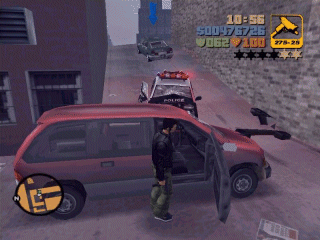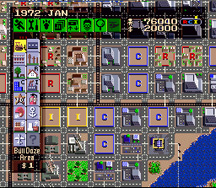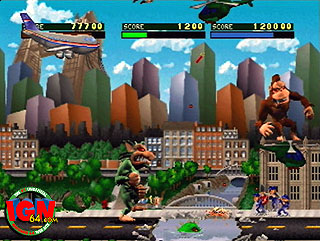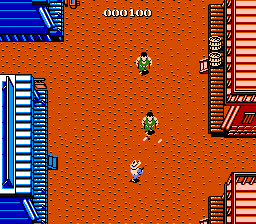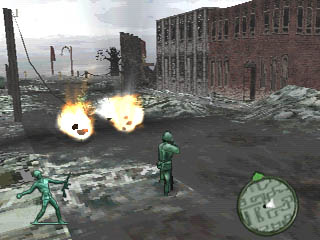Game Reviews 42 RPGs 55 Arcade 34 Puzzle 18 Platform 10 Strategy Sections QB News Site Archives Game Guides Our Projects Entertainment Awards QB Links Interact QB Chatroom Mailing List Submissions Link to Us Job Openings (6/8/2003) What's the right way to protect children from violence in videogames? Editor Vance Velez explains why the Videogame Violence Law might not be the right solution to a very sensitive problem. With videogames becoming more realistic and more people fearing the unknown and questioning the intentions of videogame designers, the politicians in the state of Washington decided to take matters into its own hands by passing a law in May 20 that "levies a fine of up to $500 on anyone who rents or sells to someone 17 or younger computer games in which the player kills or injures 'a human form who is depicted ... as a public law enforcement officer.' Police officers and firefighters are included in that classification." (Seattle Post-Intelligencer).
This would mark the fourth time that politicians have tried to pass laws regulating violent content in videogames. Similar previous ordinances were dropped in Indianaoplis, Cincinatti, and St. Louis after the IDSA (Interactive Digital Software Association) presented a convincing argument of the artistic content in videogames, thus giving videogames the same first amendment freedom of speech rights given to books, movies, and other media. Now, the IDSA has filed a similar lawsuit against the Washington videogame regulation law, but this time State Legislator Mary Lou Dickerson is confident that this latest revision of the law will be upheld. "The lawsuit filed today against Washington's ban on sales or rentals of cop-killing games to children comes as no surprise. Certain elements of the video-game industry clearly want the right to sell any game, no matter how brutal, racist or sick, to any child, no matter how young." (Yahoo.com) While the purpose of the Washington law seems noble, IDSA argues that the purpose of the law (to help minors from not exhibiting "hostile and anti-social behavior" and to "foster respect for public law enforcement officers") is not "compelling" (Seattle Post-Intelligencer), and also believes that such a law is in violation of Freedom of Speech rights. This lack of "compellingness", perhaps, is the most convincing argument that the IDSA has against the latest videogame violence law. When thinking of "a human form which is depicted as a law enforcement officer", it's easy to think about games like Grand Theft Auto 3 where it's possible to kill many policemen without any major in-game consequences. But when it comes to games where a player can kill human-like law enforcement, Grand Theft Auto is really just the proverbial icing on the cake.
Consider Simcity, a game in which the goal is to play the role of "mayor" and turn a town into a prosperous metropolis. While being a game that can teach children about economics, commerce, and industrialization, Simcity would be in violation the Washington Videogame Violence Law because of one gameplay feature, the "Disaster" button. This button, which if chosen by the player, can cause earthquakes, floods, and other random acts of nature to take effect on the city. Should any of these random disasters accidentally knock over a police station or fire department, it would technically be the player killing human-like law enforcement officials even though no violence can be seen on the screen. In fact, the entire scenario is symbolic of hundreds of deaths.
Speaking of disasters, what about videogames where the player takes on the role of a heavily fictional character? Games like Rampage would be in violation of the Videogame Violence Law because the giant monsters in the game can crush police cars. Any game where the police are part of some corrupt organization (like Streets of Rage) would be in violation. Even games where the killing itself is somewhat vague is in question. That means no more Morrigan's Eternal Slumber move in Marvel vs. Capcom, because if that's used on Captain Commando it's technically the sucking of a policeman's soul (even though no violence is ever seen on-screen during the move.)
What about games where the player plays the role of the police himself or herself? Theoretically, when a player plays a policeman who dies in a videogame, they have in essence killed the law enforcement officer and is thus in violation of the Washington Law. So, any game where you play a law enforcement officer and can die in the game is out the window. So, children should not be playing games like RoboCop, Gunsmoke, or Final Fight. That too would be in violation of the Washington law.
What about games whose "human-form law enforcement" not only comes in the form of police officers, but in the form of firemen or military officials? Games where the player can kill other law enforcement directly or indirectly, regardless of the level of graphic violence actually seen, would also be in violation of the Videogame Violence law. That means so long for franchises like Advance Wars, Army Men, G.I. Joe, Contra, and Commando. Heck, even superheroes who enforce the law, like Superman and Spiderman, are technically in violation of the law. The deeper this law is observed, the more it seems that it is a law designed to protect children from all the wrong games. I agree that children need to be protected from extremely violent and sexually explicit images. But the real key to making such protection occur is an active effort in part of the retailers, the ESRB (Entertainment Software Ratings Board), the government, and (most importantly) parents. First, if the government were to collaborate with the ESRB, that would help the government coordinate their laws with a videogame rating system that is already established to help protect children from violent videogames. Second, once that collaboration takes place, then it would be more feasible to fine retailers for selling violent videogame products (M or Ao-rated games) to minors because the violent and sexually-explicit images in videogames would both be labelled and firmly defined by the label on every videogame box. And third, should all these precautions fail and the child still gets an M or Ao-rated game into the house, the parents should be responsible enough to monitor their children and make sure that that particular game does not enter the console itself. It's a shame that state governments don't communicate better with IDSA and ESRB. The resources are there now to make an ideal videogame violence law that protects children from violent and sexually explicit images in videogames, is fair to retailers, and recognizes the freedom of speech rights of videogame designers. The Washington law, because it's built on fear of the unknown and lack of communication, fails to do all three of these goals. Article Written by Vance Velez, Editor |
V Planet! Archive
Site Highlights
Site Watch
Affiliates
Links |

